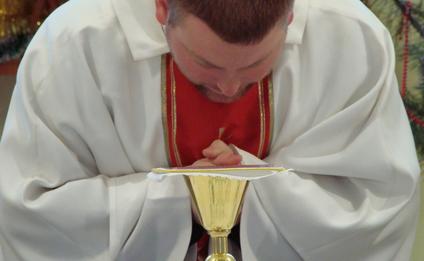The Evangelizing Priest
I will appoint over you shepherds after my own heart, who will shepherd you wisely and prudently (Jeremiah 3:15).

Evangelization is the work of the whole parish, of individuals, and priests. Here we examine the specific contribution of the priest in the evangelizing work of the parish.
To help understand the work of evangelization let me list the three goals presented in the USCCB Document Go and Make Disciples.
- “To bring about in all Catholics such an enthusiasm for their faith that, in living their faith in Jesus, they freely share it with others.” (46).
- “To invite all people in the United States, whatever their social or cultural background to hear the message of salvation in Jesus Christ so they may come to join us in the fullness of the Catholic faith.” (53).
- “To foster Gospel values in our society, promoting the dignity of the human person, the importance of the family, and the common good of our society, so that our nation may continue to be transformed by the saving power of Jesus Christ.” (56)
All three goals apply to all of us as a parish and as individuals. In discussing the role of the priest, I wish to focus on the first goal. The priest brings the gospel message with enthusiasm to the parishioners who in turn are called to share it with the people they encounter in the world.
As a child we learn the basic foundations of our faith. As adults we need to understand how to live our faith in the world. We do not learn everything we need to know as children. We need to keep learning about our faith as adults; deepening our personal relationship with Jesus. Ideally, every parish would have the resources to offer regular adult enrichment opportunities outside of Mass. Ideally, everyone would want to come to this sessions. I say ideally but it is not the reality of the situation. Often the only time people come to church is for Sunday Mass. This leaves the priest (or deacon) as having a unique opportunity to help people deepen their relationship with Jesus. While the whole Mass draws us into relationship with God, it is in the homily that this unique opportunity exists.
The purpose of the homily is always to help us deepen our relationship with Jesus and how us learn how to live our faith in the regular daily moments of our lives. A homily should have a teaching aspect but it is not a Bible Study in a classroom sense. The homilist needs to understand the scripture passage as it is written and then be able to apply its main points to life today. I spend between five and ten hours a week preparing a Sunday homily. I do not sit down and prepare the whole homily in a single afternoon. I spend an hour to an hour and a half each day beginning Sunday or Monday. The first two days are spent in my own personal reflection of the readings. I photocopy the readings so I can make scratch notes right next to the verses. About the third day I read commentaries on the scripture passages and compare to my notes. Throughout my preparation I ask myself what does it say, what does it mean, and "so what?" By "so what" I am referring to the relevance the passage has in life today. By reflecting on the readings in this way I am first feed myself and then, in turn, I hope to feed others.
What makes a good homily (or outside of Mass a good presentation)? People can talk about it being well-written, easy to follow, or brief. This all sounds good but to me the judge of a good homily is when it helps people to better live their faith and come closer to God.
There is another way in which the priest contributes to the evangelization work of the parish. The priest, especially as pastor, must show that evangelization ministry is important by his support and involvement for the ministry. Now, priests cannot be everywhere or doing everything. That's why we need to have an evangelization team. The priest may may not be able to be an active participant in everything the evangelization team does but he should be providing support and encouragement. He checks in with the team to see if they need help. He speaks about it from the pulpit. He helps the parishioners see their baptismal call to bring Christ to the world. A priest who does none of these things sends a message saying it isn't important. Sometimes all it takes is a five minute phone call once in a while to the team leader to see how things are going.
For Further Reading
- "What Sort of Church Should We Be?"
- "What Does It Mean To Have a Personal Relationship With Jesus?"
- "What Does it Mean to be Disciple?"
- "Talking About God"
- "Evangelization: A Call for All"
- "The Evangelizing Mass"
- "Evangelization: What Can a Parish Do?"
- "Evangelization: What Can You Do?"
- Videos
- My blog articles on Evangelization
- My blog articles on Apologetics
Bibliography
DeSiano, Frank, CSP, "American Culture and Catholic Parishes." "Priest as Evangelizer Workshop," Paulist National Catholic Evangelization Association," Instructor Rev. Frank DeSiano, CSP. March 2010.
DeSiano, Frank, CSP, "The Mass: Instrument of Evangelization," The Priest, September 2009, Vol. 63 No. 9, pp. 79-86.
DeSiano, Frank, CSP and Kenneth Boyack, CSP, Creating the Evangelizing Parish. New York:Paulist Press. 1993.
United States Conference of Catholic Bishops, Go and Make Disciples, 2002. Available online at http://www.usccb.org/beliefs-and-teachings/how-we-teach/evangelization/go-and-make-disciples/.
